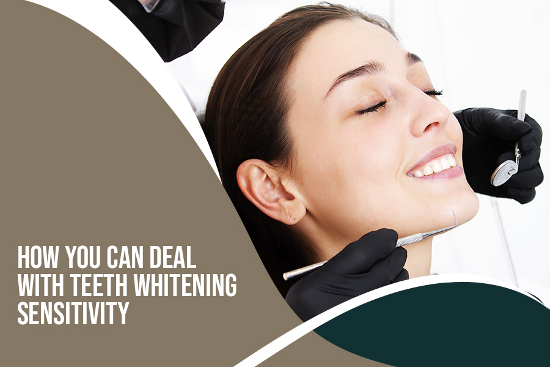According to dental experts, it is quite common to suffer from the problem of sensitivity after getting your teeth whitened from a dentist or using at-home kit. Tooth sensitivity after whitening takes place as the chemicals used to whiten teeth can cause some irritation to the tooth nerves. The sensitivity also occurs by using whitening products and you may be able to lessen it. It is suggested that you consult with an emergency dentist at St Albans and know about good dental hygiene habits as well as the whitening products that will be safe for you. Go through this blogpost to know how you can deal with the sensitivity related to teeth whitening method. And, if you want immediate treatment for sensitive teeth, check out the best General dentist in chattanooga.

1. Brush teeth by using a desensitising toothpaste – You need to brush three times in a day by using a desensitising toothpaste for at least 10 days before performing the treatment. These toothpastes can block the extreme pain from your tooth surface o inner nerves. Take a soft-bristled toothbrush for rubbing the toothpaste in circular motions and you should brush teeth for at least three minutes during each session. By using Fluoride toothpaste and desentising agents, you can be assured that they will work better when you cannot rinse mouth properly.
2. Use a desensitising liquid, paste or gel – You are advised to wipe teeth properly so that they can become dry and use a clean cotton swab on them. Try to place a large dot of your product at the tip of the swab and rub it properly onto your teeth surface. You are advised to leave it on the teeth for the specified time before rinsing mouth with water. These products have potassium nitrate in them that can numb your teeth nerves and lessen the sensitivity.
3. Fill your whitening tray with a desensitising gel – You need to fill the whitening tray with desensitising gel and then place it on the teeth for nearly 30 minutes before the treatment. Once you are ready for the treatment, take out the tray, rinse it and then refill with a bleaching agent. You can rinse mouth for removing the gel residue and whitening tray should fit properly by covering teeth. In case it reaches your gums, this can lead to slight burning or increased sensitivity that can be considered a white contour along your gum line.
4. Take pain medication before the treatment – You have to take the recommended dosage of anti-inflammatory medication nearly one hour before undergoing the treatment. By taking the medication early, you can start working before the procedure and continue taking it after the treatment when you suffer from any sensitivity. If you do not know about what medications to take, then you can ask the dentist about it.
5. Select at-home whitening kit – Most at-home teeth whitening kits have carbamide peroxide in them which is the main bleaching ingredient. Peroxide seems to be very effectivebut it might cause irritation to the nerve endings of your teeth and lead to sensitivity. You may select an in-home kit that has low peroxide level of 5 – 6%. When you choose higher peroxide dose, this won’t guarantee effectiveness and might cause severe pain. Different at-home whitening options include – mouth trays with gel, strips, whitening toothpastes, paint-ons, mouthwash and whitening gum. By opting for tray-based whitening treatment, the tray should fit properly over the teeth.
6. Apply recommended amount of whitening agent – You may want to use more gel for getting the results quickly but you should not go for it. You are advised to follow the instructions carefully and improve your dental health. By using lots f agent, this can lead to gum irritation and vomiting when you swallow it.
7. See a dentist when the sensitivity is there – If the teeth bother you constantly for 48 hours after the treatment, it is definitely a good idea to visit your dentist. He will take a close look at your teeth to find out if whitening is the reason for sensitivity and there are other underlying causes like a tooth cavity. By seeing your 24-hour emergency dentist at St Albans, you can get the toothpaste or actual strips needed for whitening teeth at home. However, your dentist might suggest you a better alternative to treat teeth properly.
8. Leave whitening products for the specified time – You can increase the timing beyond the package instructions for making your teeth whiter and brighter. This will erode the tooth enamel and lead to further problems with decay and sensitivity caused due to fractures in the enamel.
9. Do not take hot and cold drinks – During the first 24 to 48 hours after the procedure, the teeth will be extremely sensitive. You are advised not to take hot and cold drinks and even if you do not have any pain, you need to stay alert and avoid teeth exposure to extreme temperatures. Try to avoid acidic foods and drinks as they may cause irritation and inflame your healing mouth. Also avoid eating colored foods, drinking and smoking as these can stain your enamel which is very dangerous during the first 48 hours.
10. Choose products with Fluoride to remineralise teeth – There are some toothpastes and mouthwashes that have Fluoride in them. As fluoride can block the pain from oral nerves, this can cause less sensitivity. When you use fluoride, you are advised not to eat anything for 30 minutes as this gives it more time to become effective. Use a fluoride gel over the teeth for at least 5 minutes as this cab increase the flow of saliva for better remineralisation of enamel.
Thus, you will have to book appointment with St Albans dentist who will deal with teeth whitening sensitivity. You can be assured of getting rid from teeth sensitivity and having stronger and whiter teeth.
